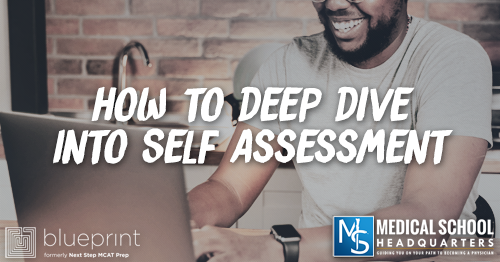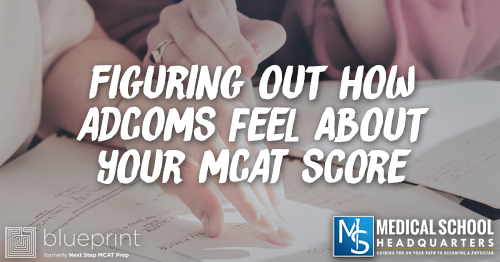Apple Podcasts | Google Podcasts
Session 249
Today, Ali and I discuss the most underutilized tool by students who do not do well on the MCAT: full-length exams. We share why they’re the key to MCAT success!
We’re joined by Armin from Blueprint MCAT. If you would like to follow along on YouTube, go to premed.tv.
Listen to this podcast episode with the player above, or keep reading for the highlights and takeaway points.
[02:40] Why Full-Length Exams Are So Important
The MCAT is not an hour test but it’s seven and a half-hour test. It contains content, sections, and topics that could be tested. And the best way to do well on this test is to take it multiple times.
Ali recommends taking at least seven to eight practice tests before you take your MCAT. That way, you will get to know the format, build stamina, and build your focus. All of these skills cannot be built by just studying for the test, and so, you want to go through it multiple times before you can master it.
[03:58] The Diagnostic Test
Ali explains the diagnostic will always feel harder as you’re starting your prep. If you have the time and if you want to test the hypothesis, repeat it three months into your prep. Then maybe it’s not going to look that hard. It’s not going to be as difficult because it was just your first introduction to the MCAT.
The Purpose of the Test
The diagnostics test is designed to introduce you to the MCAT in a way you see the passage-style questions. Even easy concepts can be a bit more difficult on the MCAT just because of the way AAMC writes questions and how they test them on the MCAT.
'The MCAT is going to change the way you think about the content you've seen in undergrad just because of the way it's applied.'Click To TweetNot only each content is tested slightly differently than you’ve seen, but the contents are mixed up on the MCAT. Therefore, you want to learn to look at the material differently and you want to also learn to incorporate material together in order to answer a single question. And the only way to do this is through practice. This is why diagnostics are difficult just because it’s your first time seeing these types of questions.
Prepping for the Diagnostic
Before taking the diagnostic, Ali recommends downloading the MCAT AAMC content PDF on their website. That way, you will have an idea of what the sections look like and what kind of content is being tested on each section, as well as what skills are being tested. Spend a day with the document, then take your diagnostic test to see where you stand on things before you start prepping for that.
Does the Score Matter?
Ali explains that your diagnostic score only tells you where you are and how much effort you need to put into it. And so, just because you got a 480 doesn’t mean you’re not going to build your skills along the way to do better on the MCAT.
[09:22] How Many Full-Length Exams to Take
Ali suggests taking as many as you can. There are five AAMC practice tests. Four of them are scored, one of them is the AAMC sample test released before they figured out the scoring of the test. Be sure you’re able to take all five of them and think of them as your requirements.
Then there are full-length exams available from different test prep companies including Blueprint MCAT. Blueprint’s first one is available for free so you can try it, see it, and look at the analytics that you get out of it.
Ali recommends taking at least three or four full-length exams outside of the five AAMCs. And so, this will put you at seven to nine full-length exams.
[11:22] When to Take the Full-Length Exam
Ali says a big mistake many students make is taking multiple full-length exams in a short period of time, so you want to space them.
'Fine-tune the way you approach passages and questions in between practice exams.'Click To TweetAli adds that students need to review it properly. It’s probably going to take as much time as taking the exam, or even more. Review every question whether you got it right or wrong, but avoid getting too deep into contents or topics that you’ve never reviewed before. Review them on the surface level and look for any passive information that could have helped you answer the question even without you knowing the content.
The order of the tests doesn’t matter as long as you take them and as long as you take them fairly late in your prep.
If you’re taking the MCAT in March, and you’re starting today, don’t use all of your AAMC resources today. Because these tests are designed to show you how AAMC tests the MCAT and to help predict what your score will be on the MCAT. Otherwise, they lose the predictive value if you use them too early.
Take your AAMCs probably in the last five or six weeks before your test. Space them in a way that the last exam you take is exactly one week before the test. And take the exam one at a time.
When taking sample tests, Ali suggests having the AAMC sample test broken into sections. For instance, take one section a day during the last week before your test. It doesn’t give you the score so it might not cause anxiety. This way, you’re practicing with AAMC material and not taking a full-length exam seven and a half hours two days before that test. You’re not getting a score so there’s less anxiety attached to it.
[18:48] Retaking the MCAT
For those students who need to retake the MCAT and have obviously gone through the practice tests, Ali’s advice is that if you’ve seen them once, and it’s been multiple months before you took the test, you’re going to have to repeat them.
Even if you’re not getting a super predictive value out of them, you’re still getting AAMC practice a week or two before the test.
A lot of people who need to retake get some false sense of security because they have retaken those AAMC full-length exams and got great scores. But they’re not realizing that they’re just remembering the answer from the previous.
[21:45] Tips for Reviewing Full-Length Exams
When reviewing the full-length exam, you’re mostly looking at your mistakes, and what you can learn from each mistake. But Ali says always look at the data you have available to you and how it should inform your prep going forward. And that’s part of the reason you need to space your full-length exam. Look at what percentage of questions you’re missing per topic.
With Blueprint exams, you can look at how you’re doing per skill. It’s not only per topic but per what type of questions you’re getting right or wrong. They will also break them down by passage questions versus pseudo discrete questions. All of this data is very valuable because you can find small things you might have missed.
'Evaluate the information you get from the full-length exam and use it to change the way you prep.'Click To TweetLinks:
SEARCH SITE
SEARCH SITE
LISTEN FOR FREE












